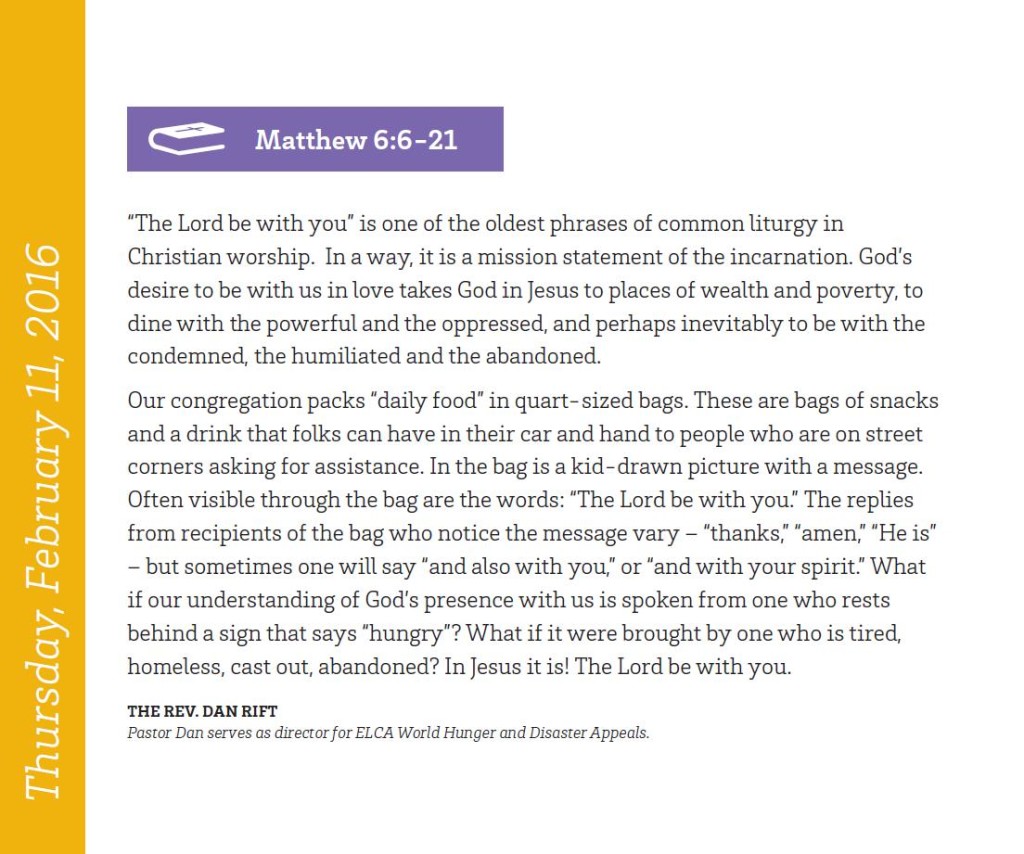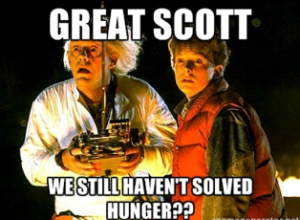“As we journey together through the time God has given us, may God give us
the grace of a welcoming heart and an overflowing love for the new neighbors
among us.” – ELCA, A Social Message on Immigration, 1998.
Aware of the special challenges refugees, migrants, and displaced persons face, ELCA World Hunger has long supported companions and partners that work with people who have been forced to leave their homes for a variety of reasons. Partners like Lutheran Immigration and Refugee Service (LIRS) and the Lutheran World Federation (LWF) are critical actors in this work.
Within days after the terrorist attacks in France, governors throughout the United States proclaimed that they would no longer accept Syrian refugees. As of November 18, 26 governors had issued such statements. Legally, of course, governors cannot stop refugees, but they can make it very hard on them, by withholding state funds to help them resettle, by refusing to issue state identification, or by increasing the already rigorous screening process for certain refugees or immigrants. On November 20, the House of Representatives voted to suspend the program allowing Syrian and Iraqi refugees into the United States.
This presents a good occasion for recalling some of the reasons Lutherans support this important work. The Lutheran Immigration and Refugee Service (LIRS) has issued a response to these developments, noting poignantly, “To close the door on resettling Syrian refugees would be nothing less than signing a death warrant for tens of thousands of families fleeing for their very lives.” But there are other reasons Lutherans continue to accompany immigrants and refugees beyond the dire consequences many of them currently face. (For some background to a Lutheran view on undocumented immigration, see this earlier post.)
#1 –Remembering who we were
Christian ethics, in general, and Lutheran ethics, in particular, begin with memory. The Hebrew Scriptures tell a story of our ancient ancestors enslaved in Egypt. They were strangers in a strange land, but God led them to freedom, and it is this action of God that lays the foundation of their own vocation toward strangers: “You shall also love the stranger, for you were strangers in the land of Egypt” (Deuteronomy 10:19). The special concern for widows, strangers, and orphans in the Hebrew Scriptures is rooted in God’s care of the people when they were helpless and landless.
It isn’t an overstatement to say that, for Lutherans, the whole of the moral life is memory. From a religious perspective, good works aren’t done out of blind obedience or to earn a spot in Heaven; for Lutherans, good works are done out of gratitude for the grace of God that saved us when we could not save ourselves. They are done in memory of God’s ways of acting toward us. We were wandering spiritually, and God welcomed us, comforted us, and saved us.
Lutherans, too, can look at more recent history of our own displacement. After World War II, nearly one in six Lutherans in the world was a refugee or a displaced person. Some found permanent homes in Europe; others languished in camps. Thanks to advocacy in part on their behalf, Congress passed the Displaced Persons Act of 1948, which opened the doors to wandering peoples. Many displaced Lutherans found homes in the United States because this country opened its doors, even accepting those German Lutherans whose country had been at war with the US. Once here, the National Lutheran Council and other faith-based agencies were critical in helping the refugees resettle.
Spiritually and historically, we are a wandering people whose lives have often depended on the hospitality of others.
#2 – Seeing who we are
As a white, straight, cisgender male, I cannot once recall being asked to speak for all white people, all cisgender men, or all straight people. But I can recall numerous times when I have heard other people asked to speak for their entire race, their entire ethnic community, or their entire gender. This is perhaps one of the most complex and pernicious elements of privilege. My privilege lets me assume I will always be treated as an individual, rather than as merely a representative of an entire group.
As social media exploded with invective calling for the banning of all Syrian refugees because of the nationality of an alleged Paris terrorist, it was no surprise that my suggestion of increasing surveillance of all men went unheeded. After all, men represent the vast majority of terrorists both foreign and domestic, men are overwhelmingly responsible for mass shootings in the United States, and men are far and away the perpetrators of violence in the home. If we are serious about protecting communities from violence, perhaps we should start with policies that circumscribe the freedom of men.
Of course, that won’t happen, because men are still privileged the world over, so their gender is not lifted up as problematic in the same way that ethnicity or nationality might be. Those in the center have the privilege of being treated as individuals, while those on the margins are viewed merely as a group. We saw a similar dynamic at work in regards to anti-Asian racism during World War II. While German Americans and Italian Americans had numerous exemptions from internment that kept their population in camps very low, Japanese Americans had virtually no exemption from internment and were imprisoned with little question, despite the fact that all three countries of origin were at war with the United States. Those of European descent were treated as individuals and separately interrogated, whereas those of Japanese descent were treated as a group, with few individual considerations.
For Lutherans, this type of discrimination is not merely problematic; it’s heretical. It is a denial of the foundational belief that humans are created in the image of God. This doesn’t mean that we naively assume everyone is a good person. Created in God’s image doesn’t mean “nice.” It means that each and every human being is a creature with dignity, worthy of our care. This transcending identity – image of God – is expressed through a variety of penultimate identities – racial, ethnic, sexual, gender, and many more. But our foundational identity as images of God grounds each in dignity. What makes a person worthy of our care, our hospitality, our protection? Their very creation in the image of God. This is privilege that is universal.
This doesn’t mean we have to like everyone. Nor does it mean we cannot punish persons when they do wrong. But it does mean we must respect their dignity, and doing so demands that we see what lies beneath their other identities, particularly when they differ from our own. It means a willingness to hear their story, to let them speak, to see them as more than just a Syrian or just a Muslim or just a Christian. It demands an openness to seeing God through them. “Do not neglect to show hospitality to strangers, for by doing that some have entertained angels without knowing it” (Hebrews 13:2).
#3 – Becoming whom we are called to be
It is natural to feel afraid after events like those of last week. But, for Lutherans, fear cannot be what marks our behavior toward neighbors. Lutherans believe that God has set us free from sin and death so that we can serve the neighbor confidently and boldly. We have life so that we may serve our neighbors. Presiding Bishop of the ELCA Elizabeth Eaton puts it well:
Even in the face of evil, we remain confident that the good news of Jesus Christ liberates us and gives us the freedom and courage to discover and boldly participate in what God is up to in this world…We are not naïve about possible new threats of terrorism, but denying refuge to thousands of desperate people is not who we are as Christians, nor will it guarantee our security.
Martin Luther was also clear on what courage in service of the neighbor means. In 1527, Luther responded to the question of “whether one may flee from a deadly plague.” His response was straightforward:
A man who will not help or support others unless he can do so without affecting his safety or his property will never help his neighbor.
Life together involves calculated risk. Lutherans are called to live in love of the neighbor, not in fear of the neighbor. There is no truly “safe” service. Accompanying our neighbors means walking down dark roads, facing with them situations of violence and oppression and taking risks that things will not go as planned. We do all this in awareness that a life lived in isolation and fear of one another is not a life worth living.
(Of course, it is necessary to point out here the rigorous screening process each refugee must go through before settling in the United States. The process is lengthy and involves several agencies. The recent fear of refugees is more reactionary than reasonable.)
So, faithful people will continue to accompany their displaced neighbors. LIRS and other agencies will continue their important work, and ELCA World Hunger will continue to support it. But this will get harder as irrational fear continues to snake through our communities.
You can help. Be an advocate. At the water cooler, in the classroom, during coffee hour, from the pulpit and around the table, remember who we are and whom we are called to be. We Lutherans stand in a long line of people whose existence has depended on God continually loving them despite their failings, on a Messiah opening his arms to those who crucified him, and on a government extending welcome to fearful exiles displaced by tyranny.
We are a migrant people, saved by one whose first human experience was escaping violence with his mother and father (Matt. 2:13-15).
Ryan P. Cumming, Ph.D. is program director for Hunger Education with ELCA World Hunger. He can be reached at Ryan.Cumming@ELCA.org.
Like ELCA World Hunger on Facebook – https://www.facebook.com/ELCAworldhunger/
And follow ELCA World Hunger on Twitter – @ELCAWorldHunger









